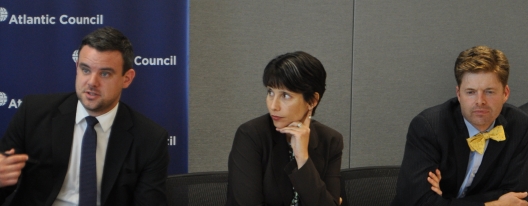 With Yemen’s national dialogue scheduled to conclude September 18 and an upcoming Friends of Yemen meeting set for September 25, the Atlantic Council convened a group of Yemen experts to explore what international donors and partners should consider in the next phase of Yemen’s transition. The roundtable discussion on September 12, 2013, featured a presentation of a new Chatham House report on Yemen’s political economy presented by analyst Peter Salisbury, with commentary from Senior Democracy and Governance Officer Chris Jennings, and independent policy analyst Fatima al Asrar, with a moderated discussion led by Hariri Center Deputy Director Danya Greenfield. Greenfield set the stage by noting three key topics relating to Yemen’s current political economy: what has or has not changed with the current transitional government and dialogue process, how the international community has engaged with the process, and what issues are involved in looking toward Yemen’s post-dialogue phase.
With Yemen’s national dialogue scheduled to conclude September 18 and an upcoming Friends of Yemen meeting set for September 25, the Atlantic Council convened a group of Yemen experts to explore what international donors and partners should consider in the next phase of Yemen’s transition. The roundtable discussion on September 12, 2013, featured a presentation of a new Chatham House report on Yemen’s political economy presented by analyst Peter Salisbury, with commentary from Senior Democracy and Governance Officer Chris Jennings, and independent policy analyst Fatima al Asrar, with a moderated discussion led by Hariri Center Deputy Director Danya Greenfield. Greenfield set the stage by noting three key topics relating to Yemen’s current political economy: what has or has not changed with the current transitional government and dialogue process, how the international community has engaged with the process, and what issues are involved in looking toward Yemen’s post-dialogue phase.
Salisbury elaborated on Yemen’s political and economic background, and presented key findings from the new Chatham House report, “Yemen: Corruption, Capital Flight and Global Drivers of Conflict.” The report concludes that despite the dialogue’s significant efforts to include marginalized groups (women, Houthis, etc.) there is severe doubt on the ground that the future government will implement the decisions reached during the dialogue because either the General People’s Congress (GPC) or al-Islah, the two largest political parties in Yemen, are likely to gain a majority in the upcoming elections. The reasoning is that neither group has any interest in reducing any of their privileges or implementing reforms that undercut their interests, which means that the future government will face even more daunting economic and humanitarian challenges.
Jennings gave a more optimistic assessment of the situation based on his understanding of the role of the United States and other international donors in supporting the transitional process. He focused on many of the positive steps that Yemen has taken in recent years, including putting together the transitional government and national dialogue, as well as highlighting the encouraging aspects of the dialogue itself, most notably its transparent, inclusive, and professional nature. Looking forward, he stressed the need for the United States to continue assistance to Yemen and build on the current momentum in the country, especially with the purpose of implementing the promises made in the transitional phase.
Al Asrar critiqued international aid to support Yemen’s political process as being short-sighted and often oriented toward serving national interests of the donor countries rather than Yemen’s most critical needs. In addition to highlighting traditional donor issues such as countries delivering less financial support than pledged, she detailed Yemen’s internal issues with international aid dispersal, such as the Executive Bureau’s unclear role in the process. She argued that the international community needs to look for a way to strengthen its relationship with Yemen by providing cohesive, predictable, and reliable aid. Overall, there was consensus among the speakers that the international community needs to adopt a long-term approach to support Yemen, looking beyond the upcoming elections.
